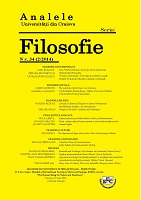SELF AND EMBODIMENT: HUMAN PERSON FROM AN ENACTIVE POINT OF VIEW
SELF AND EMBODIMENT: HUMAN PERSON FROM AN ENACTIVE POINT OF VIEW
Author(s): Teodor NegruSubject(s): Logic, Philosophy of Mind, Cognitive Psychology
Published by: Editura Universitaria Craiova
Keywords: embodiment theory; self; person; first-person perspective; mind-body problem;
Summary/Abstract: According to embodiment theory developed by cognitive sciences, man is no longer construed as being made of mind and body, as two entities that can be treated separately. But rather, we should understand the mind as an embodied structure, which cannot be analysed apart from the body. In this context, the idea of the self becomes defining for the human person, as it is a result of the way cognitive structures of the brain are modelled by the bodily sensorimotor experiences. The various approaches of self and its functions, undertaken by cognitive sciences, have led to a new conception of the person, who is no longer defined only from the perspective of her/his rational side. What differentiates the human person from the other creatures is their ability to have a first-person perspective, meaning of reflecting on their own mental states and having certain intentional states. Starting from the latest results in cognitive sciences, I would like to show how perception on the human person has changed within the embodiment theory.
Journal: ANALELE UNIVERSITĂȚII DIN CRAIOVA. SERIA FILOSOFIE
- Issue Year: 1/2014
- Issue No: 33
- Page Range: 118-131
- Page Count: 14
- Language: English

